- トップページ
- 日本国内での取り組み
- JICA関西
- 「人」明日へのストーリー
- Report from JICA Participant - Action Plan Formulation and Progress Towards and a Better Lake Chivero -

Organisation: Biological Sciences Department, University of Zimbabwe
Name: Lightone T Marufu
Position: Lecturer and Aquatic Ecologist
Name of Programme: Integrated Lake Basin Management Course
BACKGROUND
My name is Lightone Takawira Marufu and I work as an Aquatic Ecologist and lecturer in the Biological Sciences Department at the University of Zimbabwe. *The Integrated Lake Basin Management (ILBM) concept was first brought to my attention through a team from *the International Lake Environment Committee (ILEC) that had visited my university in Zimbabwe. I then applied and was invited to join a *JICA training programme in Japan for two months. The training was very beneficial and enabled my department to play an active role in coming up with tangible ways to help address some of our lake environment problems, particularly in Lake Chivero. At the end of my training I was required to come up with an action plan. I hope to be able to help future participants in developing their own action plans through this report. In this report I highlight the aspects I identified during the JICA training which helped me identify my action plan. I am glad that I also got an opportunity to participate in a JICA-ILEC follow up program in Kenya where I was able to report on progress, challenges and lessons learnt after the JICA training. I endeavour in this report to do the same and highlight how the training has benefited myself and the organisation I represent for the betterment of our lake environment.
STEP BY STEP FORMULATION OF ACTION PLAN
During the two month JICA- ILEC training we went through lectures, field visits and hands on training on issues pertaining to Integrated Lake Basin Management. The training was an eye opener as I realised that some of the aspects were possible to do and or improve through my department and our university’s three main thrusts. The University of Zimbabwe at the time of my JICA training had three main thrusts namely; Teaching, Research and Community service (now five including Innovation and industrialisation). So the first question was how to integrate and promote the ILBM concept into these three already existing thrusts so that we could come up with innovative ways to better manage our lake environment. More specifically, what new things from the JICA training could be integrated into our teaching, research and or community work thrusts as a department?
Action Plan 1: Reviving the Hydrobiology and Research Laboratory
During the ILBM training the importance of well-resourced laboratories was emphasised especially during the Lake Biwa Museum tour. The Biological Sciences Department houses the Hydrobiology laboratory. This laboratory is involved in water quality monitoring, management, training and research. Reviving and helping to resource the Hydrobiology lab thus became my first action plan. We have since formed an Aquatic Ecology Research Team which is involved in research in the laboratory and helping to revive it. I am glad to report that some equipment as depth finders, fridges, oxygen meters and chemicals for the laboratory was acquired through the various team members in the group and with the help of other stakeholders. Efforts to equip the lab are still on-going. The lab is also used for teaching and holding laboratory demonstrations when conducting ILBM concept related courses.
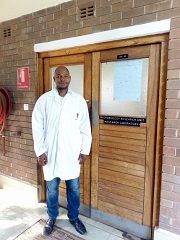
Infront of the entrance of the Hydrobiology and Research Laboratory in the Biological Sciences department, University of Zimbabwe.
Action Plan 2: Training of the ILBM concept
Since teaching and community service were already part of the core business of my department, the second action plan involved promoting the ILBM concept through the teaching and training platforms we already had. This was done through development of short courses for key stakeholders such as City of Harare, Airforce and Environmental management Agency (EMA). This also involved integrating the ILBM concept into some undergraduate courses such as Wetland Ecology, Aquatic Ecology, Microbiology and Environmental Impact Assessment which are part of the BSc honours in Biological Sciences degree that we already offer. The concept was also integrated into the teaching of three MSc programs; Masters in Tropical Ecology, Masters in Tropical Fisheries and Hydrobiology and has been approved to be part of a new MSc degree in Applied Water Science & Ecosystem Management which will have the ILBM as one of its core aspects. The material acquired during the JICA training is being used as teaching resources.
Action Plan 3: University participation in Promoting ILBM Concept
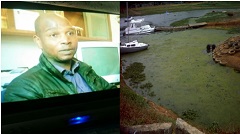
Conducted interviews on the national television broadcaster on ways we can better manage Lake Chivero’s pollution problems including use of ILBM concept.
The role of universities in research, raising awareness and monitoring exercises was indicated during the JICA training. My department has managed to set up an ILBM Platform that is administered through the department and co-ordinates research and collaboration with other stakeholders in catchment management. I have conducted awareness interviews on national television and talked about how ILBM concept can be useful in solving pollution problems in our lakes.
Action Plan 4: Research
During the JICA training informative research and monitoring was highlighted as an important aspect in lake basin management. Lessons learnt during the JICA training was used to formulate and inspire research that would reflect efforts towards improving our aquatic systems. To date we have four DPhil students (including myself), three MSc studies and more than six undergraduate students who have conducted research in Lake Chivero and Lake Kariba. Research areas included on wetlands, invasive species, water quality monitoring and GIS aspects all taught during the JICA training. The department has since published more than 10 peer reviewed academic papers on issues linked to lessons learnt from the ILBM concept.
Action Plan 5: Conduct Seminars and Workshops
Information dissemination and stakeholder participation were emphasised during the JICA training. I included this as a possible action plan due to the advantage of the university as a source of information and role in community service. The department has managed to host seminars and taught about ILBM to stakeholders such as Harare residents, Harare City Council and some local churches. I managed to also take part and share knowledge gained from the JICA training at a workshop held in a neighbouring country (Zambia) in 2016.
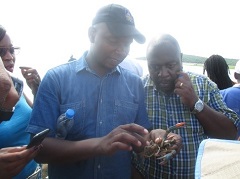
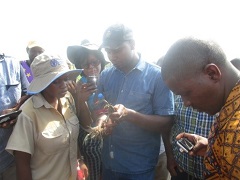
Explaining the possible impact of invasive species in a field workshop in Sinazonke, Zambia in 2016.
Action Plan 6: Capacity building
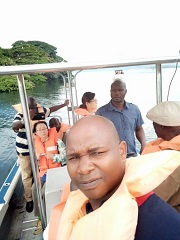
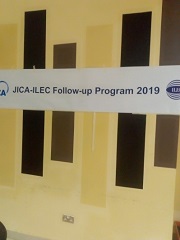
Taking part in a JICA- ILEC Follow-up Program 2019 and took lessons on Lake Victoria, Kenya.
During the JICA-ILEC training highlighted the need for capacity building. The action plan was thus meant to capacitate more team members from my department in knowledge of the ILBM concept. This was done by sharing material (printed and soft copies) and lessons learnt during the JICA training. The material provided has since been used by some colleagues in their DPhil studies and to improve their teaching material. Capacity building is still ongoing and thanks to JICA and ILEC in 2019 I managed to go for a very beneficial follow up program in Kenya were I had opportunity to learn from experiences from both Kenyan and Ugandan ex-participants of the JICA training program. Capacity building is an on-going process and is important for all stakeholders involved in lake basin management.
Action Plan 7: Applying for funding
During the JICA training it became apparent that funding was a key aspect in order to better manage our lake environment and even to fund the action plans I had formulated. I am happy to report that we were able to raise more than US$30000 towards research, equipment and ILBM awareness campaigns from local funders. Some of our funders included the Zimbabwe Research Council and the University of Zimbabwe Data Collection Fund and personal funds from departmental members all of which were local funders. This meant actively applying for funding selling the ILBM concept to would be funders. For things that did not require a lot of money we were able to use personal funds and resources even to fund some of our students in the department involved in ILBM related research.
Conclusion
The JICA-ILEC training was beneficial and very practical. In formulating the Action Plan, it is good to identify the areas that your organisation is able to contribute significantly. Implementation of the action plan may require adjusting once you are on the ground but the overall goal of helping to improve the lake environment should not be lost. It is also good to evaluate your progress after a given period. Thank you to JICA for the opportunity to take part in the training and the follow up program.




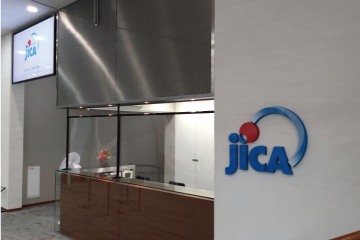

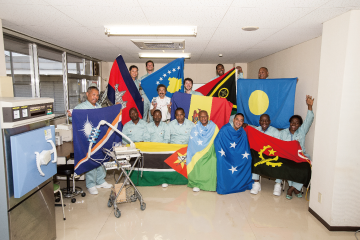






scroll